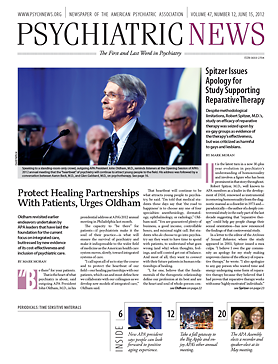When Kenneth Rogers, M.D., M.S.H.S., completed his residency and a child psychiatry fellowship at the University of South Carolina, he expected to spend a career in private practice in a nice office somewhere.
But a suggestion that he apply for the Minority Fellowship Program of the Substance Abuse and Mental Health Services Administration (SAMHSA) directed him onto a path with a wider and deeper view of the profession, said Rogers, a professor and chair of psychiatry at the Greenville Hospital System and the University of South Carolina School of Medicine-Greenville.
Serving as a fellow from 1992 to 1994 exposed him to opportunities he didn’t know existed.
“I had the chance to be a researcher and an administrator and to work on policy,” he said in mid-May at a Capitol Hill briefing for congressional staff. “You learn you can make a difference not in just the lives of individual patients but in an entire population.”
Former fellows Sherry Davis Molock, Ph.D., M.Div., an associate professor of psychology at George Washington University, and Pamela Thornton, Ph.D., M.S.W., principal health care advisor at the MITRE Corporation, also spoke at the briefing.
The program, sponsored by SAMHSA, is run by five professional organizations. In addition to psychiatry, the organizations represent the fields of nursing, psychology, social work, and marriage and family therapy.
Since 1973, more than 1,500 fellows have passed through the program, including 411 psychiatry residents.
The Minority Fellowship Program has been a spawning ground for leaders in psychiatry from underrepresented groups, Annelle Primm, M.D., M.P.H., APA’s director of minority and national affairs, told Psychiatric News.
“This constitutes a major contribution from APA to diversifying leadership in the mental health workforce, which has an impact on the reduction and elimination of mental health care disparities in diverse and underserved populations,” she said.
Besides his own experience, Rogers saw how the eight residents named Minority Fellows during the time he was psychiatry training director at the University of Maryland fared in the program.
“You could see a huge difference in those who had the experience,” he said. “The Minority Fellowship Program is the single greatest investment to change the lives of young people who are already smart and talented and need direction in how they are going to make a difference in the world and move things forward—not only in their careers, but also in their communities.”
The fellowship can boost career prospects as well, said Primm. Many graduates have been recruited into academic research and teaching programs.
Today, Rogers continues to use the insights first gained as a fellow.
“With students or trainees, I try to break down their isolation and connect people of like minds, regardless of race or ethnicity,” he said in an interview following the briefing. “And I try to reinforce the sense that their ideas have value, even if they need a little coaching to bring them out.”
As for his peers in the profession, Rogers seeks to do what the fellowship did for him—reinforce a population-based view of psychiatry.
“The big picture has more impact than most doctors think,” he said. “I want them to look beyond the clinical, beyond the level of the individual patient to see the larger implications for the community.”


